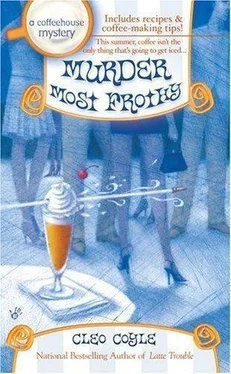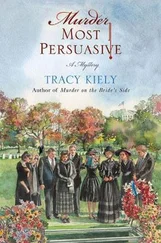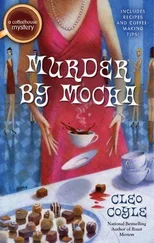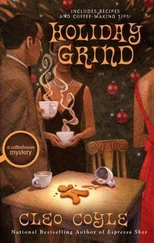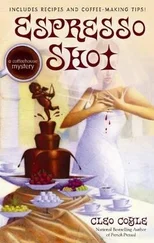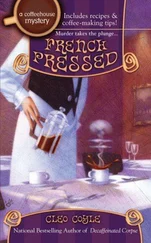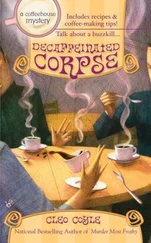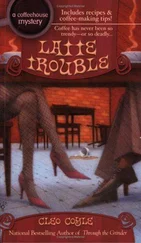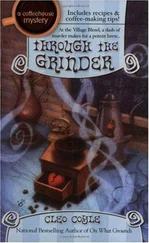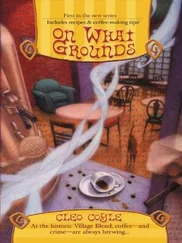“My daughter-in-law’s sister is married to Park Bennett,” she explained. “And he lives next door to John King. And his son’s on the local police force. He said his boy was at that mansion you’re staying at…David Mintzer’s place. And he said a young man was killed—”
“Yes, yes, I know all about it. But we don’t know very much at this point. David’s a little touchy so maybe you could, you know, keep it quiet.” Right. That’ll happen.
“Oh, surely, surely!” said Edna. “Of course!”
Behind me, the platinum blond on her cell phone laid on the horn of her Mercedes convertible so loud and so long that I thought I’d lose the ability to hear higher decibels. When I looked ahead, I saw the yellow Hummer in front of me had pulled away about a grand total of four car lengths.
“Whoa,” I said. “I guess I better speed up a little, sorry, Edna!”
“No problem, Clare. People are really touchy this weekend. You should have been here an hour ago. Two corporate attorneys got into a punch-out over the last honeydew melon!”
“See you soon!” I called, my car speeding up.
“See you, Clare!”
Edna waved and turned back to the farm stand. I considered what she’d just said—not the story about the honeydew punch-out. That was actually on par for how bad things could get during the crowded summer season. Wealthy Manhattan people came out here to relax, but far too many of them packed their sense of entitlement and city impatience along with their toothbrushes.
“The people out here are competitive and ambitious,” David had warned me when I first came. “They’re killers on the job. That’s how they got out here in the first place. And people who spend Monday through Friday screwing over people aren’t going to stop acting that way on Saturday and Sunday.”
The local paper was full of incidents like shoving matches over parking spaces and restaurant tables. Just last week there was an assault charge filed after a few haymakers were thrown in a health food store. (One can only presume it took place in the stress reduction supplements aisle.)
Anyway, I began to consider how Edna had heard about Treat’s death. Obviously news traveled fast in this small enclave. And I doubted a murder in East Hampton would be treated like one in the city, precisely because murder was so rare.
This small village fussed over the color of the awnings on Main Street for god’s sake. They cited you for tacking up a yard sale sign. The last thing they would tolerate was an unsolved murder in their midst. The guilty party would have to be found and successfully convicted or the competency of the authorities would be loudly and continually questioned by the powerful, opinionated people who summered here.
In a place like this, the only sure way for the murderer to escape detection would be to pin the crime on someone else…that’s why the bullet casings could have been left. Sure, it could have been a careless amateur, or it could have been a cunning assassin setting up a frame job. To do that, the shooter would have to plant the weapon somewhere the police could find it…say, on the premises of someone who might have had a motive. Then the cops would have their conviction, and the shooter would get away with murder.
The permutations of this theory were still bouncing around in my head when I turned into the shaded driveway of Cuppa J.
My grandmother grew up in a world of straightforward sensibilities, when things were labeled simply and clearly. You said what you meant, and you meant what you said. But that was a long time ago, before SNL, MTV, metafiction, The Daily Show , and the saturation of practically every aspect of contemporary culture with irony.
Sure, “Cuppa J” sounded like a casual, unassuming joint, but those were hardly the adjectives for David’s tony East Hampton cafe. Of course, he wasn’t the first to apply paradox to a restaurant name, not by a long shot. Chef Thomas Keller’s lowly sounding “French Laundry” was the most acclaimed gourmet restaurant in Napa Valley, if not the most highly regarded eatery in the country. And the Brooklyn Diner, just a few blocks away from Manhattan’s Carnegie Hall, was actually a four-star restaurant with linen tablecloths and a stellar wine list.
Cuppa J offered eclectic, upscale bistro fare, with the flavor of coffee infused into many of the main dishes (coffee can be used to great effect in meat dishes as a subtle flavoring agent, tenderizer, or marinade). The restaurant served wine and cocktails, but the star of the culinary show was the array of expensive after-dinner coffees and dessert pairings. Consequently, this season we’d become the place to book an after-dinner, pre-clubbing table. While most restaurants wound down by ten in the evening, our place was still hopping with many tables booked right up until midnight.
The two-story restaurant, with its red brick exterior, had been a Chinese restaurant before falling into foreclosure a year ago. This past spring David redid the surrounding grounds with topiaries, flowerbeds, and shade trees. He’d cleaned the brick, repainted the peeling white trim, and replaced the first floor windows with white french doors.
I drove through the customer parking area, framed with ivy-colored trellises, and around to the back of the restaurant where the employees parked. It was just past noon when I walked through the kitchen door. The waitstaff would be arriving in a few hours to prepare for dinner service from four until midnight—and I expected finally to see Joy, who I hadn’t heard from the entire day. Clearly, she was ignoring the five messages I’d already left on her cell phone’s voicemail.
“Hi, Carlos.” I waved at the restaurant’s reliable sous chef, Carlos Comacho. He was busy, cutting up onions and carrots, preparing for Executive Chef Victor Vogel’s arrival. He gave a quick smile and went back to his work.
The next person I encountered was Jacques Papas, who stuck his head out of his office at the sound of my voice. Papas acted as the restaurant’s manager, maitre d’, and sommelier. Half-French and half-Greek, Papas was in his early forties, swarthy, with dark eyes and ink-black hair (which I assumed he had dyed, because the only thing that occurred in nature that dark was a celestial black hole). We stood nearly eye to eye, but what the man lacked in size he made up for in belligerent energy. I had yet to see him smile. His usual demeanor was one of mild disdain mingled with boredom—either that or a sneer.
“Good afternoon,” I said.
The manager offered me a sour look, then crisply turned and disappeared back into his office.
Living in Manhattan, I was no stranger to divas of all stripes in the upscale restaurant game. But Papas had attitude beyond reason. At least he was consistent, I thought, shrugging off Papas’s chilly snub. He treated employees and guests with equal contempt.
After walking through the spotless, stainless steel kitchen, I strolled by the staff ’s break room and pushed through the burgundy leather double-doors, which took me into the two-story dining room.
While the exterior of Cuppa J was as unassuming as its name, the interior was another matter. David had taken great pains to model the decor after a pair of famous Paris coffeehouses—the traditional Café Marly, designed in the 1990s by Oliver Gagnére and Yves Taralon, and the more modern Le Café Costes designed in 1985 by Philippe Starck.
The Marly’s influence was evident as soon as you stepped into the breathtaking room. Dark burgundy-hued walls were gilded with art deco flourishes and lined with cherrywood wainscoting that perfectly matched the sixty-two cafe tables. Forest green velvet couches and low-backed ivory armchairs were interspersed with freestanding antique torchiers (a practical replacement for the Marly’s iron incense burners). A staircase of emerald marble framed by twin cenotaphs was situated on the south side of the dining room. And the brass-railed stairs led to an upper mezzanine fronted by more brass rails.
Читать дальше
